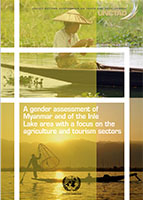
The study presents a gender analysis of the agriculture and tourism sectors in a specific region of Myanmar, the Inle Lake area, in Shan State. It investigates how to improve the wellbeing of women and of the communities to which they belong, by making women's participation in three selected agricultural value chains - tea, avocado and ginger - and in the tourism sector more beneficial. It develops a policy framework to this end for building linkages between agriculture and tourism in the region.
In Shan State - the most diverse area of Myanmar with 33 recognized ethnic groups and languages - agriculture plays a key role in the economy and forms the main source of employment for men and women in the Inle Lake area. Economic activities revolve around the family unit. The Inle Lake area is also the most popular tourist destination in Shan State, and tourism has grown rapidly in the area. Women are highly present in low-skilled job positions but are also active as entrepreneurs in the hospitality sector. In that respect, gender roles are embedded in both agriculture and tourism sectors in the region.
In Myanmar, as in many countries, the COVID-19 pandemic has revealed the vulnerability of the economy, including the agriculture and tourism sectors, to disruption arising from restrictions on the movement of people and merchandise and the closure of borders and markets. As in many other countries, the pandemic has taken a particular heavy toll on women because of the sectors where they work (e.g. tourism, agriculture, garment industry), the often informal nature of their work, and the increased burden of domestic and care work they have to shoulder.
The report argues that the development and modernization of agricultural value chains by establishing links to other sectors of the economy, such as local and international tourism, has the potential to help shift women's businesses from subsistence farming to commercial production. This would help achieve positive outcomes for the women, their communities, the Inle Lake area and the country as a whole. However, this will not happen automatically. In its policy recommendations, the report urges central and local governments to address the many shortcomings women face in the private and public spheres to unleash their potential. It identifies development agencies and local and international NGOs, self-help groups, and producer associations as potentially strong allies to reach these goals.
The study was carried out within the framework of the Myanmar project "Enhancing horticulture supply and sustainable tourism to develop business linkages", financed by the Swiss Secretariat for Economic Affairs (SECO).




